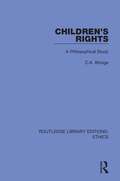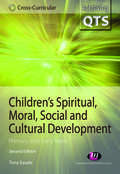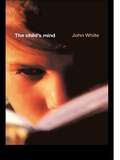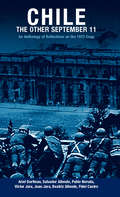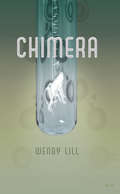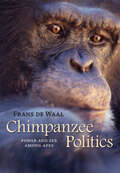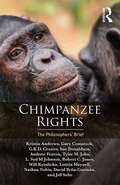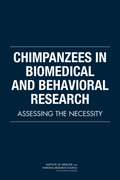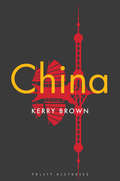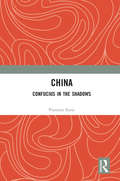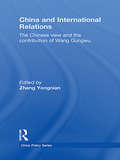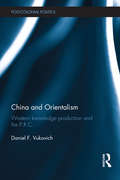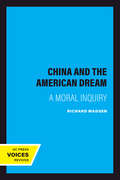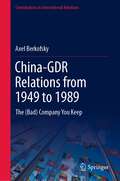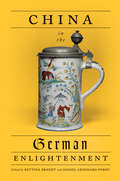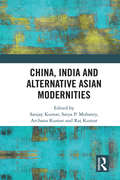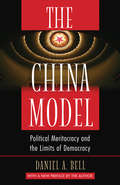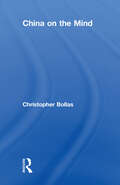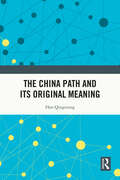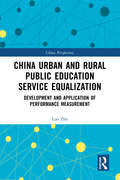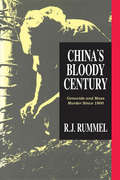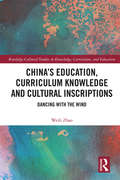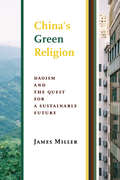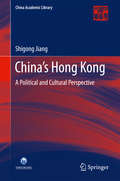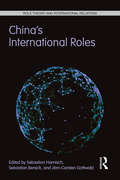- Table View
- List View
Children's Rights: A Philosophical Study
by C. A. WringeOriginally published in 1981, this book provides a detailed account of the emergence of the children’s rights movement, and analyses the concept of a right. It considers the justifications which may be sought when rights are claimed. Particular attention is given to the problem which arises when different rights are seen to be in conflict with each other or with other kinds of moral consideration. These arguments are then examined with regard to such special features of children as their incomplete but developing rationality and their material dependence on adults.
Children′s Spiritual, Moral, Social and Cultural Development: Primary and Early Years (Achieving QTS Cross-Curricular Strand Series)
by Tony EaudeThe second edition of this popular text has been revised and updated to include the new Professional Standards needed to achieve Qualified Teacher Status (QTS). Tackling these elusive but fundamental aspects of children′s development, this text places the importance of spiritual, moral, social and cultural understanding in a cross-curricular context. It directly links between children′s attainment and the wider aspects of personal development, beliefs and values, explaining the environment in which learning flourishes and demonstrating how trainees can promote this in their teaching. In addition, it helps enrich the trainee teacher′s experience, laying firm foundations for their continuing professional development.
The Child's Mind
by John WhiteHow does a child's mind work? And what should parents know about it to help them in their daily interaction with children?This book is a fascinating, non-technical introduction to the mental life of the child. Written in a simple, accessible way for those without an academic background in philosophy, the book explores and explains key elements of the child's mind without overwhelming the reader with complicated theories. Some of the areas discussed are: how children learn concepts the acquisition of beliefs, skills, knowledge and understanding the place of memory can we teach thinking skills? what is intelligence? imagination and creativity the development of emotion connections between home life, education and the school curriculum.
Chile: An Anthology of Reflections on the 1973 Coup
by Ricardo Fredes Ariel Dorfman Pilar Aguilera Salvador Allende Fidel CastroThis anthology reclaims the tragic date of September 11 as the anniversary of the US-backed coup in Chile in 1973 by General Augusto Pinochet against the popularly elected Allende government.The selection combines moving personal accounts with a political/historical overview of the coup's significance, featuring Ariel Dorfman's poignant essay, "The last September 11" and President Allende's last radio broadcast.
Chimera
by Wendy LillThis compelling drama explores the ethical controversy and public policy surrounding reproductive technologies. Wendy Lill has lived almost all the roles the play dramatizes: NDP critic for both culture and persons with disabilities, she came to politics after a career in community health care and as a reporter for the Canadian Broadcasting Corporation. Cast of 2 women and 5 men.
Chimpanzee Politics: Power and Sex among Apes
by Frans de WaalThe first edition of Frans de Waal's Chimpanzee Politics was acclaimed not only by primatologists for its scientific achievement but also by politicians, business leaders, and social psychologists for its remarkable insights into the most basic human needs and behaviors. Still considered a classic, this updated edition is a detailed and thoroughly engrossing account of rivalries and coalitions—actions governed by intelligence rather than instinct. As we watch the chimpanzees of Arnhem behave in ways we recognize from Machiavelli (and from the nightly news), de Waal reminds us again that the roots of politics are older than humanity.
Chimpanzee Rights: The Philosophers’ Brief
by Kristin Andrews Gary L Comstock Crozier G.K.D. Sue Donaldson Andrew Fenton Tyler M John L. Syd Johnson Robert C Jones Will Kymlicka Letitia Meynell Nathan Nobis David Pena-Guzman Jeff SeboSince 2013, an organization called the Nonhuman Rights Project has brought before the New York State courts an unusual request—asking for habeas corpus hearings to determine whether Kiko and Tommy, two captive chimpanzees, should be considered legal persons with the fundamental right to bodily liberty. While the courts have agreed that chimpanzees share emotional, behavioural, and cognitive similarities with humans, they have denied that chimpanzees are persons on superficial and sometimes conflicting grounds. Consequently, Kiko and Tommy remain confined as legal "things" with no rights. The major moral and legal question remains unanswered: are chimpanzees mere "things", as the law currently sees them, or can they be "persons" possessing fundamental rights? In Chimpanzee Rights: The Philosophers’ Brief, a group of renowned philosophers considers these questions. Carefully and clearly, they examine the four lines of reasoning the courts have used to deny chimpanzee personhood: species, contract, community, and capacities. None of these, they argue, merits disqualifying chimpanzees from personhood. The authors conclude that when judges face the choice between seeing Kiko and Tommy as things and seeing them as persons—the only options under current law—they should conclude that Kiko and Tommy are persons who should therefore be protected from unlawful confinement "in keeping with the best philosophical standards of rational judgment and ethical standards of justice." Chimpanzee Rights: The Philosophers’ Brief—an extended version of the amicus brief submitted to the New York Court of Appeals in Kiko’s and Tommy’s cases—goes to the heart of fundamental issues concerning animal rights, personhood, and the question of human and nonhuman nature. It is essential reading for anyone interested in these issues.
Chimpanzees in Biomedical and Behavioral Research
by Bruce M. AltevogtFor many years, experiments using chimpanzees have been instrumental in advancing scientific knowledge and have led to new medicines to prevent life-threatening and debilitating diseases. However, recent advances in alternate research tools have rendered chimpanzees largely unnecessary as research subjects. The Institute of Medicine, in collaboration with the National Research Council, conducted an in-depth analysis of the scientific necessity for chimpanzees in NIH-funded biomedical and behavioral research. The committee concludes that while the chimpanzee has been a valuable animal model in the past, most current biomedical research use of chimpanzees is not necessary, though noted that it is impossible to predict whether research on emerging or new diseases may necessitate chimpanzees in the future.
China: The Next Decade For The People's Republic Of China (Polity Histories)
by Kerry BrownChina is poised to become the world's largest economy in the next decade. But its great struggle to modernise has been one of tragedy, conflict, and challenge. From the first attempts to introduce Western ideas into the country two centuries ago, China's long march to global primacy has been above all an epic fight to renew an ancient country and culture. Leading Sinologist Kerry Brown traces this quest for renewal through the major moments of China’s modern history. Taking the reader on a journey that includes war, revolution, famine and finally regeneration, he describes concisely and authoritatively where China has come from, and where it is heading as it achieves great power status. This is a story that is no longer just about China, but concerns the rest of the world.
China: Confucius in the Shadows
by Poonam SurieThe book is a study of Confucius and the Confucian philosophy of being non-confrontationist, benevolent and with values such as filial piety and harmony. It covers an array of themes including Qufu: Confucius Country, Music and Poetry across China, Chinese Foreign Policy, Philosophy and China’s Legal System. The book is beautifully illustrated as well as includes some enlightening photographs from the Confucius Museum in Qufu. It would be of direct interest to a variety of readers from Political /History/Sociology departments as well as the avid readers. Please note: This book is co-published with KW Publishers, New Delhi. Taylor & Francis does not sell or distribute the Hardback in India, Pakistan, Nepal, Bhutan, Bangladesh and Sri Lanka.
China and International Relations: The Chinese View and the Contribution of Wang Gungwu (China Policy Series)
by Zheng YongnianDespite Beijing’s repeated assurance that China’s rise will be "peaceful", the United States, Japan and the European Union as well as many of China's Asian neighbours feel uneasy about the rise of China. Although China’s rise could be seen as inevitable, it remains uncertain as to how a politically and economically powerful China will behave, and how it will conduct its relations with the outside world. One major problem with understanding China’s international relations is that western concepts of international relations only partially explain China’s approach. China’s own flourishing, indigeneous community of international relations scholars have borrowed many concepts from the west, but their application has not been entirely successful, so the work of conceptualizing and theorizing China’s approach to international relations remains incomplete. Written by some of the foremost scholars in the field of China studies, this book focuses on the work of Wang Gungwu - one of the most influential scholars writing on international relations - including topics such as empire, nation-state, nationalism, state ideology, and the Chinese view of world order. Besides honouring Wang Gungwu as a great scholar, the book explores how China can be integrated more fully into international relations studies and theories; discusses the extent to which existing IR theory succeeds or fails to explain Chinese IR behaviour, and demonstrates how the study of Chinese experiences can enrich the IR field.
China and Orientalism: Western Knowledge Production and the PRC (Postcolonial Politics)
by Daniel VukovichThis book argues that there is a new, Sinological form of orientalism at work in the world. It has shifted from a logic of ‘essential difference’ to one of ‘sameness’ or general equivalence. "China" is now in a halting but inevitable process of becoming-the-same as the USA and the West. Orientalism is now closer to the cultural logic of capitalism, even as it shows the afterlives of colonial discourse. This shift reflects our era of increasing globalization; the migration of orientalism to area studies and the pax Americana; the liberal triumph at the "end" of history and the demonization of Maoism; an ever closer Sino-West relationship; and the overlapping of anti-communist and colonial discourses. To make the case for this re-constitution of orientalism, this work offers an inter-disciplinary analysis of the China field broadly defined. Vukovich takes on specialist work on the politics, governance, and history of the Mao and reform eras, from the Great Leap Forward to Tiananmen, 1989; the Western study of Chinese film; recent work in critical theory which turns on ‘the China-reference"; and other global texts about or from China. Through extensive analysis, the production of Sinological knowledge is shown to be of a piece with Western global intellectual political culture. This work will be of great interest to scholars of Asian, postcolonial and cultural studies.
China and the American Dream: A Moral Inquiry
by Richard MadsenFrom the "Red Menace" to Tiananmen Square, the United States and China have long had an emotionally tumultuous relationship. Richard Madsen's frank and innovative examination of the moral history of U.S.-China relations targets the forces that have shaped this surprisingly strong tie between two strikingly different nations. Combining his expertise as a sinologist with the vision of America developed in Habits of the Heart and The Good Society, Madsen studies the cultural myths that have shaped the perceptions of people of both nations for the past twenty-five years.The dominant American myth about China, born in the 1960s, foresaw Western ideals of economic, intellectual, and political freedom emerging triumphant throughout the world. Nixon's visit to China nurtured this idea, and by the 1980s it was helping to sustain America's hopefulness about its own democratic identity. Meanwhile, Chinese popular culture has focused on the U.S., especially American consumer goods—Coca-Cola was described by the People's Daily as "capitalism concentrated in a bottle."Today we face a new global institutional and cultural environment in which the old myths no longer work for either Americans or Chinese. Madsen provides a framework for us to think about the relationship between democratic ideals and economic/political realities in the post-Cold War world. What he proposes is no less than the foundation for building a public philosophy for the emerging world order.
China-GDR Relations from 1949 to 1989: The (Bad) Company You Keep (Contributions to International Relations)
by Axel BerkofskyThis book provides an in-depth analysis of the relations between China and the German Democratic Republic (GDR) from 1949 to 1989. These relations were characterized by some “ups” but many more “downs,” e.g. when, in the early 1960s, the Soviet Union ordered its vassal state in East Berlin to begin treating its former socialist comrade and brother-in-arms as an adversary and indeed enemy. Drawing on a wealth of archival material, especially from the archive of the GDR’s ruling party, this book examines selected issues and elements of East German and Chinese domestic and foreign policy. In order to better grasp the nature and the historical context of the bilateral relationship, it offers detailed insights into the following aspects: 1. the bilateral “honeymoon period” from 1949 to the late 1950s, which was accompanied by the two parties supporting and applauding each other’s oppressive domestic and ill-fated economic policies, including Mao’s Great Leap Forward and the Cultural Revolution; 2. relations during the 1960s, when the “Sino-Soviet Split” defined the quality and level of bilateral animosities; 3. the 1970s, when Beijing replaced socialist comradeship with East Berlin with trade and aid from the US and West Germany; and 4. the resumption of Sino-East German relations in the 1980s and the subsequent period up to the Tiananmen Square protests and the collapse of the GDR in 1989. The book will appeal to historians, political scientists and scholars of international relations, as well as policymakers, diplomats, and others with an interest in this previously under-researched area.
China in the German Enlightenment
by Bettina Brandt Daniel Leonhard PurdyOver the course of the eighteenth century, European intellectuals shifted from admiring China as a utopian place of wonder to despising it as a backwards and despotic state. That transformation had little to do with changes in China itself, and everything to do with Enlightenment conceptions of political identity and Europe's own burgeoning global power. China in the German Enlightenment considers the place of German philosophy, particularly the work of Leibniz, Goethe, Herder, and Hegel, in this development. Beginning with the first English translation of Walter Demel's classic essay "How the Chinese Became Yellow," the collection's essays examine the connections between eighteenth-century philosophy, German Orientalism, and the origins of modern race theory.
China, India and Alternative Asian Modernities
by Satya P. Mohanty Archana Kumar Raj Kumar Sanjay KumarThe conception of modernity as a radical rupture from the past runs parallel to the conception of Europe as the primary locus of global history. The essays in this volume contest the temporal and spatial divisions—between past and present, modernity and tradition, and Europe’s progress and Asia’s stasis—which the conventional narrative of modernity creates. Drawing on early modern Chinese and Indian history and culture instead, the authors of the book explore the provenance of modernity beyond the west to see it in a transcultural and pluralistic light. The central argument of this volume is that modernity does not have a singular core or essence—a causal centre. Its key features need to be disaggregated and new configurations and combinations imagined. By studying the Bhakti movement, Confucian democracy, and the maritime and agrarian economies of China and India, this book enlarges the terms of debate and revisits devalued terms and concepts like tradition, religion, authority, and rural as resources for modernity. This book will be of great interest to researchers and academicians working in the areas of history, Sociology, Cultural Studies, literature, geopolitics, South Asian and East Asian Studies.
The China Model: Political Meritocracy and the Limits of Democracy
by Daniel A. BellWesterners tend to divide the political world into "good" democracies and "bad" authoritarian regimes. But the Chinese political model does not fit neatly in either category. Over the past three decades, China has evolved a political system that can best be described as "political meritocracy." The China Model seeks to understand the ideals and the reality of this unique political system. How do the ideals of political meritocracy set the standard for evaluating political progress (and regress) in China? How can China avoid the disadvantages of political meritocracy? And how can political meritocracy best be combined with democracy? Daniel Bell answers these questions and more.Opening with a critique of "one person, one vote" as a way of choosing top leaders, Bell argues that Chinese-style political meritocracy can help to remedy the key flaws of electoral democracy. He discusses the advantages and pitfalls of political meritocracy, distinguishes between different ways of combining meritocracy and democracy, and argues that China has evolved a model of democratic meritocracy that is morally desirable and politically stable. Bell summarizes and evaluates the "China model"--meritocracy at the top, experimentation in the middle, and democracy at the bottom--and its implications for the rest of the world.A timely and original book that will stir up interest and debate, The China Model looks at a political system that not only has had a long history in China, but could prove to be the most important political development of the twenty-first century.
China on the Mind
by Christopher BollasSeveral thousand years ago Indo-European culture diverged into two ways of thinking; one went West, the other East. Tracing their differences, Christopher Bollas examines how these mentalities are now converging once again, notably in the practice of psychoanalysis. Creating a freely associated comparison between western psychoanalysts and eastern philosophers, Bollas demonstrates how the Eastern use of poetry evolved as a collective way to house the individual self. On one hand he links this tradition to the psychoanalytic praxes of Winnicott and Khan, which he relates to Daoism in their privileging of solitude and non verbal forms of communicating. On the other, Bollas examines how Jung, Bion and Rosenfeld, assimilate the Confucian ethic that sees the individual and group mind as a collective, while Freudian psychoanalysis he argues has provided an unconscious meeting place of both viewpoints. Bollas’s intriguing book will be of interest to psychotherapists, psychoanalysts, Orientalists, and those concerned with cultural studies.
The China Path and its Original Meaning
by Han QingxiangThis book examines the fundamental issues of Marxism in the 21st century and explores its contributions through the explanatory framework of the unity of continuity and stages, spatial and temporal analysis, and the dialectical relationship of universality and particularity of Marxist historical development. Marxism in the 21st century is a concept closely related to the historical changes of capitalism and the historical shift of the centre of the socialist movement. Marxism in the 21st century should be developed on the basis of the continuation of the fundamental position, value orientation, ideals and beliefs, basic principles and methodological principles of Marxism. This book explores the logic of the development of modernisation in contemporary China and the world, the communication and interaction between contemporary China and the world, and the coexistence of socialism and capitalism. It also examines the relationship between the adaptation of Marxism to the Chinese context, Marxism in contemporary China and in the 21st century. The book also discusses Xi Jinping's Thought on Socialism with Chinese Characteristics for a New Era, which provides a scientific theoretical system for interpreting the contemporary world and could become the core theoretical form of Marxism in the 21st century. The book will be essential reading for students and scholars of Marxism, Chinese studies and modernisation theory.
China Urban and Rural Public Education Service Equalization: Development and Application of Performance Measurement (China Perspectives)
by Luo ZheCentering on issues of disparity and equality in basic public education services in China, this book proposes a performance measurement system that assesses and guides equality of basic public education in urban and rural areas. The author moves beyond traditional research approaches by drawing on methods of public management and mathematics. Pivoted on an improved balanced scorecard model, a complete set of indicators and measuring tools are constructed, whereby the process of education equality can be more effectively measured, managed, and steered. Grounded in empirical studies on public education in the country's Sichuan Province, the book advances suggestions on better policies and optimizing implementation for the purpose of attaining equitable public education services in urban and rural areas. Finally, the study envisages further research directions and possible applications of the performance appraisal model. The title will be of value to scholars and students of education studies, especially those interested in public education, educational equity, and Chinese public education services.
China's Bloody Century: Genocide and Mass Murder Since 1900
by R. J. RummelExcept for Soviet citizens, no people in this century have endured so much mass killing as have the Chinese. They have been murdered by rebels conniving with their own rulers, and then, after the defeat in war of the imperial dynasty, by soldiers of other lands. They have been killed by warlords who ruled one part of China or another. They have been executed by Nationalists or Communists because they had the wrong beliefs or attitudes or were simply in the wrong place at the wrong time. In China's Bloody Century, R.J. Rummel's careful estimate of the total number of killings exceeds 5 million.How do we explain such killings, crossing ideological bounds and political conditions? According to Rummel, the one constant factor in all the Chinese mass murder, as it was in the Soviet Union and Nazi Germany, is arbitrary power. It was the factor that united warlords, Nationalists, Communists, and foreign armies. The author argues that whenever such undisciplined power is centralized and unchecked, the possibility exists that it will be used at the whim of dictators to kill for their own ends, whether the aim is ethnic-racial purity, national unity, development, or utopia.The book presents successive periods in modern Chinese history, with each chapter divided into three parts. Rummel first relates the history of the period within which the nature and the amount of killings are presented. He then provides a detailed statistical table giving the basic estimates with their sources and qualifications. The final part offers an appendix that explains and elaborates the statistical computations and estimates.While estimates are available in the literature on the number of Chinese killed in Communist land reform, or in Tibet, or by the Nationalists in one military campaign or another, until this book no one has tried to systematically accumulate, organize, add up, and analyze these diverse killings for all of China's governments in this century. For
China’s Education, Curriculum Knowledge and Cultural Inscriptions: Dancing with The Wind (Routledge Cultural Studies in Knowledge, Curriculum, and Education)
by Weili ZhaoWith a focus on the role of discourse and language in education, this book examines China’s educational reform from an original perspective that avoids mapping on Westernized educational sensibilities to a Chinese environment. Zhao untangles the tradition-modernity division expressed in China’s educational language about the body and teacher-student difference. Exploring the historical and cultural implications of the ways China’s schooling is talked about and acted upon, Zhao argues that Chinese notion "wind" (feng) is a defining aspect of Chinese teaching and learning. Incorporating Western and Chinese literature, this book explores the language of education, curriculum, and knowledge on a cross-cultural landscape and as cultural inscriptions.
China's Green Religion: Daoism and the Quest for a Sustainable Future
by James MillerHow can Daoism, China's indigenous religion, give us the aesthetic, ethical, political, and spiritual tools to address the root causes of our ecological crisis and construct a sustainable future? In China's Green Religion, James Miller shows how Daoism orients individuals toward a holistic understanding of religion and nature. Explicitly connecting human flourishing to the thriving of nature, Daoism fosters a "green" subjectivity and agency that transforms what it means to live a flourishing life on earth.Through a groundbreaking reconstruction of Daoist philosophy and religion, Miller argues for four key, green insights: a vision of nature as a subjective power that informs human life; an anthropological idea of the porous body based on a sense of qi flowing through landscapes and human beings; a tradition of knowing founded on the experience of transformative power in specific landscapes and topographies; and an aesthetic and moral sensibility based on an affective sensitivity to how the world pervades the body and the body pervades the world. Environmentalists struggle to raise consciousness for their cause, Miller argues, because their activism relies on a quasi-Christian concept of "saving the earth." Instead, environmentalists should integrate nature and culture more seamlessly, cultivating through a contemporary intellectual vocabulary a compelling vision of how the earth materially and spiritually supports human flourishing.
China’s Hong Kong: A Political and Cultural Perspective (China Academic Library)
by Shigong JiangThis book differs from most others of its kind, by looking at the Hong Kong issue from China's perspective, which in turn mirrors China's own situation. Through a legal lens, the author conducts a political and cultural examination of the past and the present, and provides a comprehensive overview of the many theories and problems concerning Hong Kong. Including reflections on the theory of administrative absorption of politics, a historical review of "one country, two systems" and an analysis of the form and nature of the Basic Law, it offers a valuable reference resource for studying the historical, political and legal context of Hong Kong under the principle of "one country, two systems". Instead of over-simplifying the issue of Hong Kong or only seeing it as a Chinese regional issue, the book regards it as a central Chinese issue and the key to understanding China.
China's International Roles: Challenging or Supporting International Order? (Role Theory and International Relations)
by Sebastian Harnisch, Sebastian Bersick and Jörn-Carsten GottwaldThis collection examines changes in China’s international role over the past century. Tracing the links between domestic and external expectations in the PRC’s role conception and preferred engagement patterns in world politics, the work provides a systematic account of changes in China’s role and the mechanisms of role taking. Individual chapters address the impact of China’s history and identity on its bilateral role taking patterns with the United States, Japan, Africa, the Europe Union, and Socialist States as well as China’s role in international institutions, the G-20, and East Asia’s Financial Order. Each of the empirical chapters is written to a common template exploring the role of historical self-identification, altercasting and domestic role contestation in shaping the PRC’s role. The volume provides an analytically coherent framework evaluating whether cooperation or conflict in China’s international engagement is likely to increase, and if so, the extent to which this will follow from incompatible domestic demands and external expectations. By combining a theoretical framework with strong comparative case studies, this volume contributes to the ongoing debate on China’s rise and integration into the international society and provides sound conclusions about the prospects for a transition of China’s purpose in world politics.
